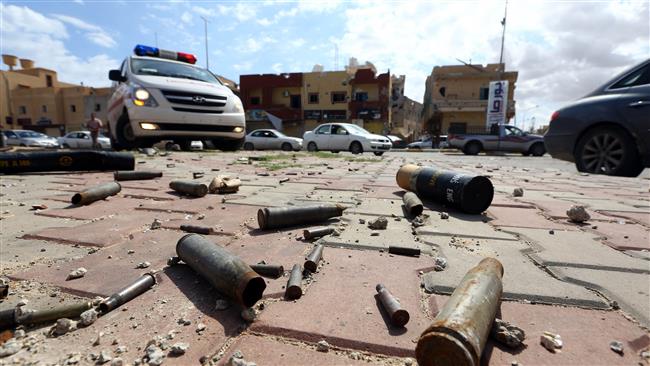28 bodies recovered after clashes near Libya capital
A recent round of armed clashes between rival Libyan factions have left nearly 30 people dead as a local human rights group recovers bodies bearing gunshot wounds and signs of torture at the site of the confrontation near the capital Tripoli.
Libya’s National Commission for Human Rights (NCHR) said Sunday that locals had found 28 bodies near a road in the town of Alhira, 60 kilometers (37 miles) southwest of the capital Tripoli.
Ahmad Hamza, from the NCHR, said the victims were from the groups opposed to the government-aligned coalition forces. He said the victims had been arrested before they were tortured and killed.
“According to the fact-finding, monitoring and documentation section of NCHR, there are signs of torture and they (the victims) were shot in the chest and head,” said Hamza, adding that families of the victims were not allowed to receive the bodies for “reasons that are not known”.
The recovery of bodies comes a week after forces aligned with Libya’s internationally-recognized government launched an operation against the rival armed groups in the Wershafana, an area largely cut off from the capital for several years and a major hub for militancy and criminal activity.
One of the major groups contributing to the coalition attacks, which is based in the town of Zintan southwest of Tripoli, had said that the operation was meant to put an end to “murder, kidnapping and acts of barbarism” in Wershafana. The military council of Zintan, however, has yet to comment on the discovery of bodies in the region.
Local authorities say around 500 families were displaced by the recent bout of violence although some 100 families have returned to their homes in recent days.
Libya has been mired in a devastating conflict since the fall of the former dictator Muammar Gaddafi in 2011. The country is effectively divided between forces loyal to Tripoli’s UN-backed government, who are aligned with North African countries to the west of Libya, and those forces who rule territories in east of the country and enjoy massive support from Persian Gulf Arab countries and are supported diplomatically by Egypt.
Israel admits assassinating Hamas leader, vows to inflict same fate on Yemeni fighters, people
VIDEO | Yemeni forces repel US-British attack, down F-18 Jet
Iran’s capabilities vast; enemy’s ‘maximum pressure’ policies all failed miserably: Senior official
Iran’s economy grew 2.7% y/y in Sep quarter: CBI
VIDEO | Freelancers in Gaza strive to stay online amid genocide
Mikati demands Israel's withdrawal from south Lebanon
Yemeni army strikes Israeli military sites with drones
‘Clock ticking’: UNRWA slams unjustifiable killing of children in Gaza













 This makes it easy to access the Press TV website
This makes it easy to access the Press TV website